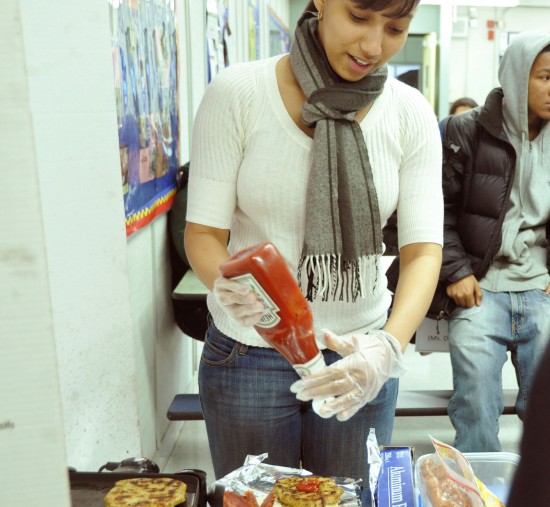
Teens run the lunch counter at Mott Haven school
At 16, Lauren Ballou is the manager of a small business. The high school junior is in charge of the Mantis Store, which sells lunch to her classmates at Crotona Academy High School on St. Anns Avenue.
During lunch hour, Ballou can be found at the back of the cafeteria, flipping chicken patties and turning sausages.
“We started out with basics—burgers–and brought in new stuff: bacon and cheese,” said Ballou. “We get new things and see if it sells. After a while, if it sells, we raise prices,” she explained with the air of a seasoned businesswoman.
Victoria Andrades, 18, mans the cash register and dispenses change from her seat at the table that serves as the makeshift store, a few seats away from Ballou.
“I write down what everybody orders, how much it cost, and after the store closes up, I tally everything and put on paper how much we made that day,” said Andrades, whose interest in math led her to take on the job of cashier for her second year at Mantis.
The Mantis Store started five years ago as part of Crotona Academy’s Learning To Work program, a 10-month job training internship, funded by the city Department of Education and operated by SoBRO, the South Bronx Overall Economic Development Corporation. The store takes its name from a praying mantis the founders discovered on the school grounds.
“Students gain the skills they need to enter the workplace,” said Eva Lopez, program manager for Youth Programs at SoBRO.
Each year about 70 students participate in the Learning to Work program. In addition to coordinating the program, SoBRO provides one-on-one student counseling that aids with the college application process.
“By the time they graduate, most of the students have a complete resume and know how to write cover letters,” said Lopez. They also learn office etiquette, including the importance of letting the boss know when they can’t come to work.
“I think it will help me get a part time job, if I work as a cashier,” Andrades said. “It gives you a lot of skills you will need for a first job,” said Ballou.
Three other girls join Ballou and Andrades to operate The Mantis Store food stand during the school year. On average, they sell 20 to 30 meals during the 45-minute lunch hour each day.
“If we own a store, this is what’s going to happen; somebody’s going to have to clean, cook and hire people.” said Ashanti Perderaux, 17, who is responsible for keeping the grill and tables clean. It was Perderaux’s idea to sell an assortment of M&Ms and chocolate bars.
She said that before she started the Learning To Work program, she didn’t know much about business. Seven months into it, she finds running a store fun and enjoys the camaraderie and responsibility she shares with her colleagues. “I’m going to have to use these skills to go job hunting,” said Perderaux.
The students, who are expected to put in 10 hours a week, earn while they learn. SoBRO pays them the minimum wage of $7.25 per hour. In March, Ballou worked five days a week and earned around $400.
The students who founded the Mantis Store wrote a business plan that they presented to the community and development department of SoBRO, which provided the capital to open the store. Each new group of students is charged with maintaining and expanding the business. They’ve done so by analyzing inventory and coming up with new strategies to make the store profitable.
Each week the group meets and considers which merchandise sold well. The students then decide what they need to restock, and whether they need to cook and serve faster or to expand their offerings.
Recently the students decided to make their offerings healthier, introducing fruit cups and switching from hamburgers to the leaner chicken burgers.
The store rings up about $400 in sales each month, yielding a profit of $200.The profit is plowed back into the store, to be spent on merchandise and equipment.
With demand rising, the students have decided to spend some of the store’s income on a bigger grill, one that will also keep grease away from the meat, making it healthier.
Hotdogs sell for $1 and a cheeseburger $2. Candy costs 75 cents while fruit snacks are 50 cents.The profit is modest, said Deborah Claudio, SoBRO’s senior youth advocate on campus “because we try to keep the prices reasonable for them to be able to afford it. We live in the Mott Haven area and money is tight, but we try to keep it as economical as possible and to put a healthy spin on it.”
A version of this story appeared in the June/July 2011 issue of the Mott Haven Herald.
